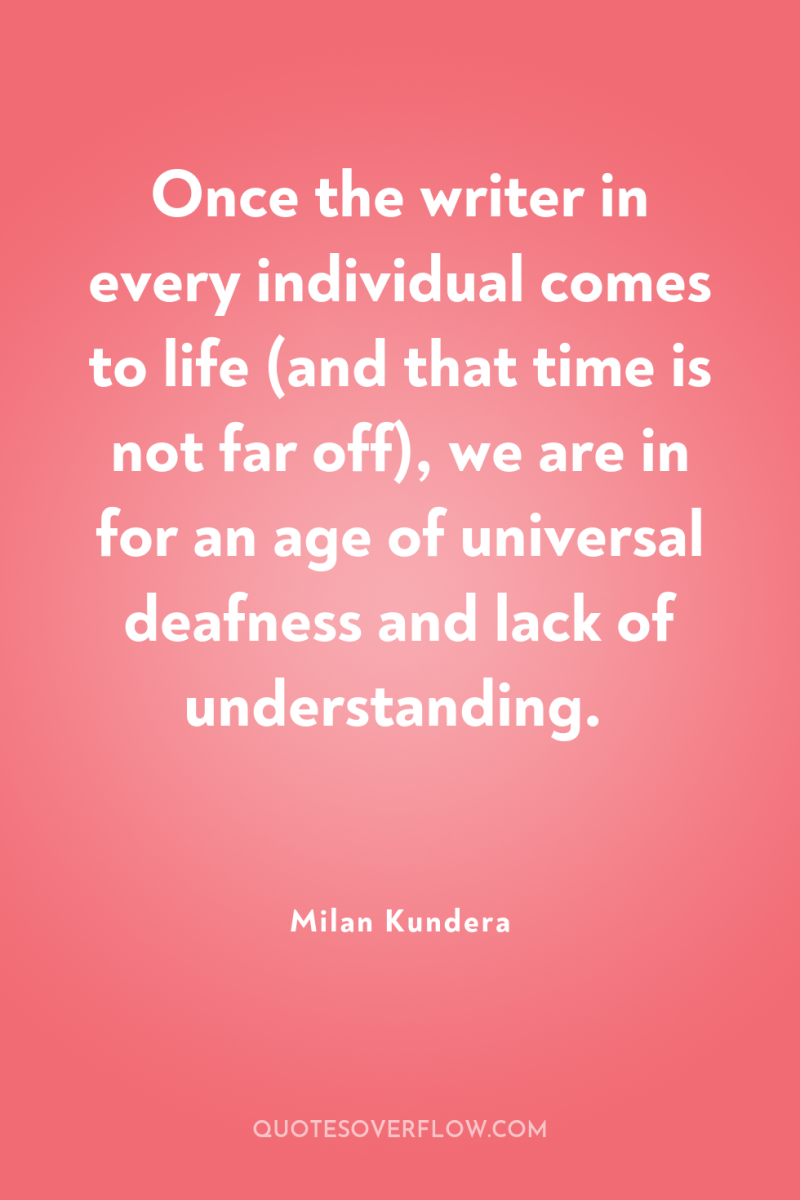
1
Oh lovers! be careful in those dangerous first days! once you've brought breakfast in bed you'll have to bring it forever, unless you want to be accused of lovelessness and betrayal.Milan Kundera

2
...because love is continual interrogation. I don't know of a better definition of love.Milan Kundera

3
Once the writer in every individual comes to life (and that time is not far off), we are in for an age of universal deafness and lack of understanding.Milan Kundera
4
When Don Quixote went out into the world, that world turned into a mystery before his eyes. That is the legacy of the first European novel to the entire subsequent history of the novel. The novel teaches us to comprehend the world as a question. There is wisdom and tolerance in that attitude.Milan Kundera
5
Children, Never look Back! " and this meant that we must never allow the future to be weighed down by memory . for children have no past, and that is the whole secret of the magical innocence of their smiles.Milan Kundera
6
The stupidity of people comes from having an answer for everything. The wisdom of the novel comes from having a question for everything.. The novelist teaches the reader to comprehend the world as a question. There is wisdom and tolerance in that attitude. In a world built on sacrosanct certainties the novel is dead. The totalitarian world, whether founded on Marx, Islam, or anything else, is a world of answers rather than questions. There, the novel has no place. .Milan Kundera
7
Encouraged by her parents’ applause, the girl went on: “Do you think we take off our tops to give you pleasure? We do it for ourselves, because we like it, because it feels better, because it brings our bodies nearer to the sun! You’re only capable of seeing us as sex objects! ” Again Papa and Mama Clevis applauded, but this time their bravos had a somewhat different tone. Their daughter’s words were indeed right, but also somewhat inappropriate for a fourteen-year-old. It was like an eight-year-old boy saying: “If there’s a holdup, Mama, I’ll defend you.” Then too the parents applaud, because their son’s statement is clearly praiseworthy. But since it also shows excessive self-assurance, the praise is rightly shaded by a certain smile. With such a smile the Clevis parents had tinged their second bravos, and their daughter, who had heard that smile in their voices and did not approve of it, repeated with irritated obstinacy: “That’s over and done with. I’m not anybody’s sex object.” Without smiling, the parents merely nodded, not wanting to incite their daughter any further. Jan, however, could not resist saying:“ My dear girl, if you only knew how easy it is not to be a sex object.” He uttered these words softly, but with such sincere sorrow that they resounded in the room for a long while. They were words difficult to pass over in silence, but it was not possible to respond to them either. They did not deserve approval, not being progressive, but neither did they deserve argument, because they were not obviously against progress. There were the worst words possible, because they were situated outside the debate conducted by the spirit of the time. They were words beyond good and evil, perfectly incongruous words.Milan Kundera

8
For he was aware of the great secret of life: Women don't look for handsome men. Women look for men who have had beautiful women. Having an ugly mistress is therefore a fatal mistake.Milan Kundera
9
Because misogynists are the best of men.” All the poets reacted to these words with hooting. Boccaccio was forced to raise his voice: “Please understand me. Misogynists don’t despise women. Misogynists don’t like femininity. Men have always been divided into two categories. Worshipers of women, otherwise known as poets, and misogynists, or, more accurately, gynophobes. Worshipers or poets revere traditional feminine values such as feelings, the home, motherhood, fertility, sacred flashes of hysteria, and the divine voice of nature within us, while in misogynists or gynophobes these values inspire a touch of terror. Worshipers revere women’s femininity, while misogynists always prefer women to femininity. Don’t forget: a woman can be happy only with a misogynist. No woman has ever been happy with any of you!.Milan Kundera
10
A mismatched outfit, a slightly defective denture, an exquisite mediocrity of the soul-those are the details that make a woman real, alive. The women you see on posters or in fashion magazines-the ones all the women try to imitate nowadays-how can they be attractive? They have no reality of their own; they're just the sum of a set of abstract rules. They aren't born of human bodies; they hatch ready-made from the computers." ~The Book of Laughter and Forgetting .Milan Kundera
11
The first step in liquidating a people, ' said Hubl, 'is to erase its memory. Destroy its books, its culture, its history. Then have somebody write new books, manufacture a new culture, invent a new history. Before long the nation will begin to forget what it is and what it was. The world around it will forget even faster.Milan Kundera
12
The history of music is mortal, but the idiocy of the guitar is eternal.Milan Kundera
13
She knew that there were all kinds of ways to make a conquest and that one of the surest roads to a woman's genitals was through her sadness.Milan Kundera
14
They were ready to sell people a future in exchange for their past... They wanted to compel him to cast his life away and become a shadow, a man without past, an actor without a role, and turn even his castaway life, even the role the actor had abandoned, into a shadow. Having turned him into a shadow, they would let him live.Milan Kundera
15
The stupidity of people comes from having an answer for everything. The wisdom of the novel comes from having a question for everything.Milan Kundera
16
She wants to have her notebooks so that the flimsy framework of events, as she has constructed them in her school notebook, will be provided with walls and become a house she can live in. Because if the tottering structure of her memories collapses like a clumsily pitched tent, all that Tamina will be left with is the present, that invisible point, that nothingness moving slowly toward death.Milan Kundera
17
At a time when history made its way slowly, the few events were easily remembered and woven into a backdrop, known to everyone, before which private life unfolded the gripping show of its adventures. Nowadays, time moves forward at a rapid pace. Forgotten overnight, a historic event glistens the next day like the morning dew and thus is no longer the backdrop to a narrator's tale but rather an amazing adventure enacted against the background of the over-familiar banality of private life.Milan Kundera
18
We will never remember anything by sitting in one place waiting for the memories to come back to us of their own accord! Memories are scattered all over the world. We must travel if we want to find them and flush them from their hiding places!Milan Kundera
19
[mother] belonged to a realm of other creatures: smaller, lighter, more easily blown away.Milan Kundera
20
(...) the woman we love ought to swim as slowly as we do, she ought to have no past of her own to look back on happily. But when the illusion of absolute identity vanishes (the girl looks back happily on her past or swims faster), love becomes a permanent source of the great torment we call litost.Milan Kundera
21
You certainly remember this scene from dozens of films: a boy and a girl are running hand in hand in a beautiful spring (or summer) landscape. Running, running, running and laughing. By laughing the two runners are proclaiming to the whole world, to audiences in all the movie theaters: "We're happy, we're glad to be in the world, we're in agreement with being! " It's a silly scene, a cliche, but it expresses a basic human attitude: serious laughter, laughter "beyond joking." All churches, all underwear manufacturers, all generals, all political parties, are in agreement about that kind of laughter, and all of them rush to put the image of the two laughing runners on the billboards advertising their religion, their products, their ideology, their nation, their sex, their dishwashing powder.Milan Kundera
22
Those who are fascinated by the idea of progress do not suspect that everything moving forward is at the same time bringing the end nearer and that joyous watchwords like "forward" and "farther" are the lascivious voice of death urging us to hasten to it. (If fascination with the word "forward" has become universal, isn't it mainly because death is already speaking to us from nearby?)Milan Kundera
23
People fascinated by the idea of progress never suspect that every step forward is also a step on the way to the end and that behind all the joyous 'onward and upward' slogans lurks the lascivious voice of death urging us to make haste.Milan Kundera
24
During the last ten years of his life my father gradually lost the power of speech. At first he simply had trouble calling up certain words or would say similar words instead and then immediately laugh at himself. In the end he had only a handful of words left, and all his attempts at saying anything more substantial resulted in one of the last sentences he could articulate: 'That's strange.' Whenever he said 'That's strange, ' his eyes would express an infinite astonishment at knowing everything and being able to say nothing. Things lost their names and merged into a single, undifferentiated reality. I was the only one who by talking to him could temporarily transform that nameless infinity into the world of clearly named entities.Milan Kundera
25
Tamina serves coffee and calvados to the customers (there aren't all that many, the room being always half empty) and then goes back behind the bar. Almost always there is someone sitting on a barstool, trying to talk to her. Everyone likes Tamina. Because she knows how to listen to people. But is she really listening? Or is she merely looking at them so attentively, so silently? I don't know, and it's not very important. What matters is that she doesn't interrupt anyone. You know what happens when two people talk. One of them speaks and the other breaks in: "It's absolutely the same with me, I.." and starts talking about himself until the first one manages to slip back in with his own "It's absolutely the same with me, I.."The phrase "It's absolutely the same with me, I.." seems to be an approving echo, a way of continuing the other's thought, but that is an illusion: in reality it is a brute revolt against a brutal violence, an effort to free our own ear from bondage and to occupy the enemy's ear by force. Because all of man's life among his kind is nothing other than a battle to seize the ear of others. The whole secret of Tamina's popularity is that she has no desire to talk about herself. She submits to the forces occupying her ear, never saying: "It's absolutely the same with me, I..Milan Kundera